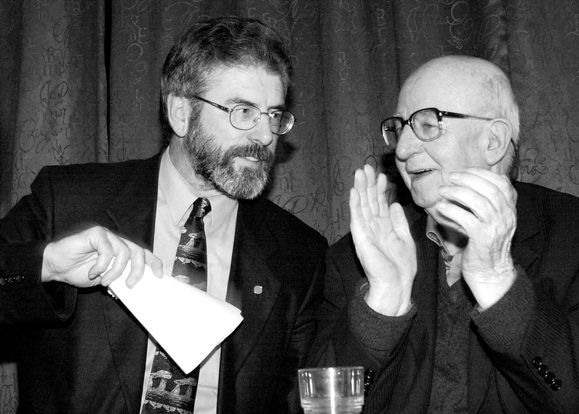An historic breakthrough was made in the Northern Ireland peace process at the end of October when the first IRA arms were put permanently beyond use in a move monitored by the International Commission on Decommissioning.
In the early hours of October 23 General John de Chastelain oversaw the disposal of what was called a “sizable quantity” of the IRA’s weapons, a move which breathed new life into a dying peace process and was heralded by politicians at home and abroad.
General de Chastelain described the decommissioning as “significant,” thereby signaling that the IRA had fulfilled the terms of the Good Friday Agreement on arms and allowing the Ulster Unionist Party to claim it was enough for them to return to the Northern Ireland Assembly.
Following a meeting with the General, UUP member David Trimble announced that his party would rerum to Stormont, thereby preventing the collapse of all the institutions by a matter of hours. He later renominated his colleagues to the parliament.
President George Bush praised the IRA for its move. Taoiseach Bertie Ahem said it was an unparalled breakthrough, and British Prime Minister Tony Blair described it as a milestone for the North.
This is without a doubt the most significant move within the republican movement since the organization declared its first ceasefire in 1994. In a statement, the organization said it had made the move in order to save the peace process and to persuade others of its genuine intentions.
“The IRA is committed to our republican objectives and to the establishment of a united Ireland based on justice, equality and freedom,” the statement began.
Outlining its engagement with the Decommissioning Commission, the IRA blamed the British government for introducing decommissioning to the political process and using it to bludgeon them at every opportunity.
“In order to overcome this and to encourage the changes necessary for a lasting peace, the [IRA] has taken a number of initiatives [regarding arms].
“No-one should doubt the difficulties these initiatives cause for us, our volunteers and our supporters,” they warned. “The political process is now on the point of collapse. Such a collapse would certainly, and eventually, put the overall peace process in jeopardy.”
Bertie Ahem predicted that the move would pave the way for the full implementation of the Good Friday Agreement. “Today’s historic developments are profoundly important,” he said. “The Government recognizes the full import of what this decision has meant for the IRA and welcomes it as an historic and substantial contribution to the peace process.”
Full implementation of the Good Friday Agreement, he said, meant a new beginning to policing and a progressive rolling program reducing the levels of British troops and military installations in the North.
And, as a response, Northern Secretary John Reid announced that four military installations will be immediately removed. Troop levels are to be immediately reduced, and people charged with crimes or threatened with extradition for crimes committed before April 1998, when the Good Friday Agreement was signed, will not be pursued.
The unprecedented move was signaled one day previously, when Sinn Féin leader Gerry Adams announced that he and Martin McGuinness had requested the IRA take the “groundbreaking” step to save the preace process from collapse.
Adams was speaking in Belfast as his colleague and Education Minister, Martin McGuinness, was preparing to deliver a keynote speech in Washington, D.C.., where he met with members of the Bush administration and the Irish-American community. During a Belfast press conference, Adams said that both he and McGuinness had told the IRA that the crisis facing the North’s political institutions would be resolved by a move on weapons.
Adams called the announcement a “defining moment” in the peace process and said that many people were frustrated and angry over the crisis in the political process.
He was referring to a recent walkout of the Northern Assembly by Ulster Unionist David Trimble and other UUP Ministers, as well as by the Democratic Unionist Party, led by Ian Paisley. Secretary of State for Northern Ireland Dr. John Reid had to decide whether to suspend the institutions yet again, to allow time for further negotiation between the parties.
Adams said the Ulster Unionists were using the issue of decommissioning to undermine the Belfast Agreement. But the issue of British weapons, not just IRA weapons, must also be resolved, he said. “Our commitment to the process is absolute.” He predicted that some people would claim the IRA had acted under pressure, while others would disparage any move they made.
“Everyone else knows that the IRA is not an organization that bows to pressure or which moves on British or Unionist terms. IRA volunteers have a view of themselves and a vision of the Ireland they want to be a part of. This is what will shape their attitute to this issue. Republicans in Ireland and elsewhere will have to strategically think this issue through,” Adams commented.
He asked Republicans to do their best to prevent the situation from sliding back into conflict, and he praised IRA members, saying they had been “at the heartbeat of the struggle for justice and freedom.
“In my view the IRA is genuinely committed to building a peace process in which the objectives of Irish republicanism can be argued and advanced. The Army has repeatedly demonstrated leadership and patience and vision and I respect absolutely its right to make its own decision on this issue. I would appeal to Republicans to stay united. I would particularly appeal to IRA volunteers and their families and to the IRA support base to stay together in comradeship. This is the time for commitment to the Republican cause. It is a time for clear heads and brave hearts.”
He also added that other parties to the process should show vision and generosity, as this would turn the current difficulties around and “transform a crisis-riven process into an organic and a people-centered movement towards a democratic peace settlement.” ♦


Leave a Reply